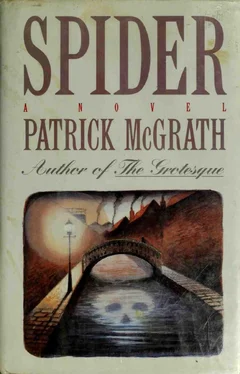Time passed. Twenty years, this was my Canada. Oh enough. My Canada—my Ganderhill! With your walls of faded red brick, your barred gates and locked doors, your courtyards and corridors, your flower gardens where men in ill-fitting flannels and squeaky shoes sat twitching and writhing on wooden benches, while their restless mad eyes gazed out over the terraces to a cricket field far below, and beyond that the perimeter wall, and beyond that rolling farmland and the wooded hills of Sussex in the distance... During the later years in Ganderhill I worked in the vegetable gardens;
I wore stout black boots and baggy yellow corduroy trousers.
I remember in the summer the smell of fresh-mown grass, a smell that comes back to me so strongly now that I stop writing, almost convinced that it is in the room—the smell of fresh-mown grass, here in this chilly midnight garret! Flere, in this bleak season of fogs and rain, at the top of this morgue of a house—fresh-mown grass! Outside in the dark wet streets dead leaves clog gutters and drains and drift in heaps between high black metal railings with spiked, spearlike tips; and the Spider smells fresh-mown grass! Oh, see me seated at this rickety table in all my shirts and jerseys, pencil poised over the smudged page of the journal and the long horse-head lifted, heavy with shadow in the hollows of the cheeks and the eye sockets, a knobbled stubbled bulb of a head as it lifts, sniffing, a dead thin one hanging from its lip, into the gloom as the memories of asylum cricket come drifting back and bring in their train the smell of fresh-mown grass! Fool, Spider! But better you smell grass than gas.
What to tell you of those years? Mr. Thomas was the first of them to grow distinct when the world began to come back into focus; he never threatened to shatter me with his eyes, the way other men did. Those mild brown eyes of his: the skin around them was crosshatched with tiny crinkled lines, and they reassured me, I don’t know why. There was the pipe, too, the constant pipe, and I don’t know why that reassured me either but it did, the steady sucking, punctuated, every few minutes, when he took it from between his lips, by the exhalation of smoke; perhaps the smell of the tobacco, the fragrance. After supper I’d stay on the ward, I’d read, I’d play cards, do a jigsaw. It was a quiet life.
The first ward I was on in Ganderhill was what they called a hard-bench ward. Not difficult to find the reason for that: there wasn’t a soft chair in the place (apart of course from in the attendants’ room by the stairwell). Men did a great deal of sleeping in those wards and I was no exception. After breakfast I stretched myself out on a bench, the woodwork all cankered with cigarette burns, and using my shoe for a pillow I’d doze off and try and stay comatose for as much of the day as I could. Who cared? Nobody cared. On the hard-bench wards men were mute, incontinent, hallucinated. If I couldn’t get a bench I simply curled up on the floor under a blanket. Nobody cared. We were all immobile and withdrawn up there, and in this there was a certain comfort. What I didn’t like were the doorless lavatories, I could never get used to them, it was an agony of humiliation to me to sit on the toilet in a doorless lavatory, exposed to the stray glance of any passing eye: it occurs to me now that much of the later trouble I had with my intestines (they were pulled to the back of my body and twisted about my spine from arse to skull like a snake) may have originated in the disturbance of the excretory function that I suffered on the hard-bench wards.
I learned to roll fat ones and thin ones on a hard-bench ward, we took our tobacco seriously there. It’s an odd thing, no matter how deep a man may be sunk in his own melancholy, his own madness—adrift, you’d think, all lines to the social body cut—yet he’d never fail to give you his butt to light your own with, there is no madness so deep that it excludes you from the community of tobacco. Here’s another odd thing: a man gets a proper cigarette from an attendant, a Woodbine, a Senior Service. He sits on a bench and smokes. A second man stands nearby, arms hanging limp at his sides, face blank, dumbly waiting. In due time he is given the butt. This he smokes until it burns his fingers, and then he drops it on the floor. A third man immediately picks it up, and careless of burning his fingers he smokes the rest of it.
On a hard-bench ward nothing was expected of you except that you fail. You were there because you had failed, failing was what you did, you would fail again. In this there was comfort for the Spider, a certain vigilance could be relaxed. What was comforting was the indifference: nobody cared about anything but his own damage. Routine was basic and solid, a few rude struts to give the day shape: lining up for meals at the front of the ward, shuffling there for twenty minutes, then down the narrow stairs, gates clanging, keys on bars, the shouts of distant attendants, a file of gray patients in ill-fitting shirts and trousers, flapping shoes—no belts or shoelaces on a hard-bench ward—to line up in the vast clattering barn of a dining hall, and pass along trestle tables behind which kitchen workers in greasy white aprons dolloped onto your plate soggy servings of mashed vegetables and horse-meat, or dogmeat, or stale cod. For pudding, spotted dick and custard with lumps. In the late afternoon the day shift went off, and for the hours before supper we were locked up or else herded together in the dayroom under the supervision of a single attendant. This I hated, to be crowded in with the others like that, and vainly I begged to be allowed to join the two or three privileged men who wandered the ward by themselves.
From time to time someone became upset—I remember John Giles, a big man, furious about the withdrawal of his privileges, storming up and down his room; as I passed on my way down to the dayroom I remember thinking: John’s about to blow. I may have mentioned it to someone, I don’t remember—then suddenly the sound of a window smashing, and it was John Giles of course. Out of the dayroom we poured, but not before the attendants were running down the ward from either end—what a racket their boots made on the tiles!—to where John, spitting and cursing, stood trembling in his doorway and clutching a great ugly jagged piece of glass. They didn’t rush him, not with that piece of glass in his hand. “Put it down, John,” one of them said, “come on, John, do us all a favor”—but John was way over the top, he spat and snarled and told them what he’d do to them if they got any closer. Two of them then went into a room. A moment later out they came, at a run, with a mattress held up before them like a shield. Then they were on top of poor John and all I could see were his arms and legs flailing from the sides of the mattress as he struggled there, pinned against the door, his shouts muffled by the mattress. In due course he let go of the glass and shortly after that they trussed him up in buckles and stout canvas webbing and marched him off to a safe room at the end of the ward, where he shouted himself hoarse and then fell asleep. But I tell you the story only for the sequel. Down in the yard a week later, poking around in a flower bed, I found a shard of glass shaped like a dagger, and looking up, realized it came from the window John Giles had smashed. I took it back up to the ward and showed it to Mr. Thomas. He led me into a side room, where on the table he had reconstructed the entire window, every fragment in place as though it were a jigsaw puzzle—every fragment, that is, but one. He took my glass dagger and slipped it into the last thin gap, it completed the shattered window, and with a grunt of satisfaction he turned to me and said, “I was worried about that one, Dennis, I lost sleep over that one, I could see someone losing their eye.” And then he put a hand on my shoulder, and I walked back out onto the ward—odd thing, this—almost choking for the sheer joy of that hand on my shoulder.
Читать дальше












